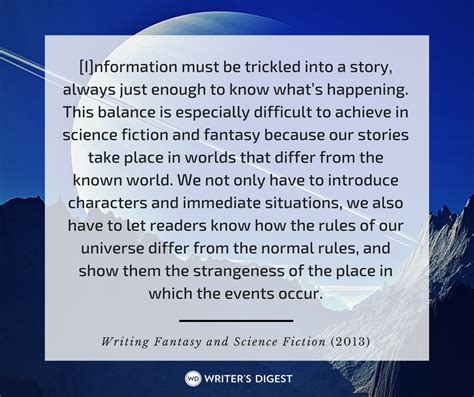Science fiction is a broad genre of literature, film, television, and other media that explores the potential impact of science and technology on future societies. It often depicts fantastic worlds and technologies that are beyond the scope of current scientific understanding, and it can explore a wide range of themes, including the human condition, the nature of reality, and the possibilities of the future.

Key Characteristics of Science Fiction
There are several key characteristics that define science fiction as a genre:
- Speculative nature: Science fiction is based on the idea of speculation, imagining possible futures and exploring the implications of new technologies and scientific discoveries.
- Emphasis on science and technology: Science fiction stories typically feature advanced technologies, futuristic gadgets, and scientific concepts as central elements of the plot or setting.
- Exploration of social and philosophical themes: Science fiction often uses its speculative scenarios to explore broader social, philosophical, and existential themes, such as the nature of humanity, the meaning of life, and the future of civilization.
Subgenres of Science Fiction
Within the broad category of science fiction, there are numerous subgenres that focus on specific themes or settings:
- Hard science fiction: Emphasizes scientific accuracy and realism, with stories based on established scientific principles and theories.
- Soft science fiction: Focuses more on social and philosophical themes, with less emphasis on scientific detail or accuracy.
- Space opera: Features large-scale conflicts and adventures in space, often with epic plots and characters.
- Cyberpunk: Explores the impact of advanced technology on urban environments, often focusing on themes of social inequality and cybernetics.
- Dystopian fiction: Depicts futuristic societies that are characterized by oppression, poverty, and government control.
- Utopian fiction: Presents visions of ideal or perfect societies that have overcome social or technological challenges.
Impact of Science Fiction
Science fiction has had a profound impact on popular culture, inspiring countless works of art, literature, and film. It has also influenced scientific research and technological development by sparking imagination and inspiring scientists and engineers to pursue innovative ideas.
According to a survey by the Pew Research Center, 72% of Americans have read at least one science fiction book or seen a science fiction movie or TV show.
Science fiction can also provide valuable insights into the potential benefits and risks of future technologies, and it can help us to better understand the challenges and opportunities that lie ahead.
If you’re interested in writing science fiction, here are a few tips to get you started:
- Read widely: Explore different subgenres of science fiction to get a sense of the range of possibilities and styles.
- Study science and technology: Gain a basic understanding of scientific principles and technologies to help ground your stories in reality.
- Develop your imagination: Science fiction is all about imagining new worlds and possibilities, so let your imagination run wild.
- Explore social and philosophical themes: Use your stories to explore deeper themes and ideas that resonate with your readers.
- Don’t be afraid to experiment: Science fiction is a genre that embraces innovation and experimentation, so don’t be afraid to try new ideas and push the boundaries of the genre.
1. What are some examples of classic science fiction novels?
- “Frankenstein” by Mary Shelley
- “1984” by George Orwell
- “Brave New World” by Aldous Huxley
- “The Hitchhiker’s Guide to the Galaxy” by Douglas Adams
- “Dune” by Frank Herbert
2. What are some popular science fiction TV shows?
- “Star Trek”
- “The X-Files”
- “Battlestar Galactica”
- “Westworld”
- “Stranger Things”
3. What are some of the most influential science fiction movies?
- “2001: A Space Odyssey”
- “Blade Runner”
- “The Matrix”
- “Minority Report”
- “Arrival”
4. What are some of the latest trends in science fiction?
- Artificial intelligence
- Space exploration
- Climate change
- Social inequality
- Virtual reality
5. What are some of the benefits of reading science fiction?
- Stimulates the imagination
- Expands knowledge of science and technology
- Develops critical thinking skills
- Provides insights into the future
- Entertains and provides escapism
6. What are some of the challenges of writing science fiction?
- Creating convincing and believable future worlds
- Balancing scientific accuracy with storytelling
- Exploring complex social and philosophical themes
- Staying original and innovative in a crowded genre
